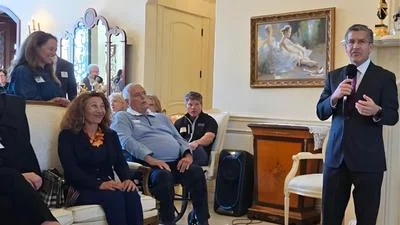Cook County might not have egg on its face, but it's got some soda to wipe off, Madeleine Doubek, policy director of the Better Government Association (BGA) said on ABC7’s "Weekend Watch" recently.
“Everyday it’s some new development with this," she said. "It’s like somebody took the pop can, shook it up, handed it to (Cook County Board President) Toni Prekwinkle, and it exploded all over the place, and we’re still feeling the ramifications,” Doubek said.
According to Doubek, consumers purchasing sugary beverages in the Chicago area are paying some of the highest drink prices in the country. According to the Illinois Policy Institute, while the 1-cent-per-ounce soda tax is not particularly high for jurisdictions with similar measures in place, in Chicago it is added to a 3 percent city soft drink sales tax and a cumulative 10.25 percent sales tax.

Cook County Board President Toni Preckwinkle
The BGA pointed out that this means someone buying a 2-liter bottle of soda priced at $2.49 will pay $3.49 at the register, and a 12-pack of 12-ounce cans, priced at $4, would actually cost $5.97.
In Cook County, the tax applies to all sweetened beverages, including juices and drinks sweetened with non-caloric sweeteners, with the tax ordinance noting that those sweeteners have also been linked to poor health outcomes.
Doubek noted that the new tax has faced several challenges.
“The Illinois Retail Merchants Association (IRMA) sued, and the judge delayed the implementation of the tax, then went ahead and allowed it to be implemented,” Doubek said. “(The IRMA is) appealing that, so that’s ongoing, meaning that this is not going to go away for some time. Then Preckwinkle turned around and said she was going to countersue them for damages. What a chilling effect, and not a good government way for someone to operate.”
The IRMA lawsuit challenging the constitutionality of the new tax delayed it from July to August, and Preckwinkle, the tax’s chief proponent, briefly sought to collect $17 million in damages for the lost revenue, before reconsidering and withdrawing the countersuit, the Chicago Sun-Times reported.
But now the federal government has also weighed in.
“We have practically a new lawsuit everyday,” Doubek said. “The latest is the U.S. government is now telling the state of Illinois that its $87 million in food stamp funding may be pulled now because they believe the way that this tax is imposed is illegal.”
The U.S. Department of Agriculture, which oversees the country’s Supplemental Nutrition Assistance Program (SNAP), informed Cook County that the tax could not be applied to SNAP purchases at any stage, creating problems with a county plan to allow retailers to apply the tax, then offer refunds, the Chicago Tribune reported. The county has now rescinded that option for retailers, requiring them to find an alternative.
Doubek noted that Preckwinkle is in a precarious situation with the tax, with other county officials calling for its repeal and introducing an ordinance to prevent suits like the one she threatened.
According to Doubek, Preckwinkle actually ran for office in 2010 on a campaign of removing a 1-cent sales tax, with memorable ads ironically using Benjamin Franklin’s saying, “A penny saved is a penny earned."
.jpg)





 Alerts Sign-up
Alerts Sign-up